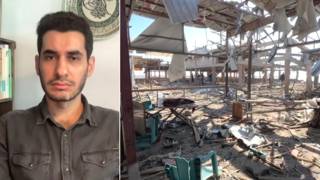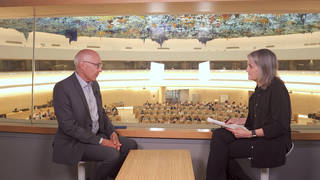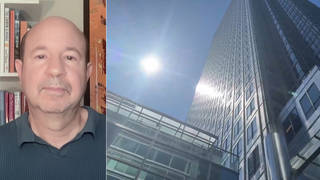
We speak to anti-war activists in New York, Florida, California, Iowa and Ohio who organized protests listed as threats by the Pentagon. [includes rush transcript]
The Pentagon conducting domestic surveillance on peaceful protests and meetings has sent tremors though the country’s anti-war movement.
Some fear a repeat of the Vietnam War era when it was revealed that the military had conducted investigations on at least 100,000 American citizens.
The domestic surveillance was so extensive that Congress placed new laws on military spying inside the United States.
On Wednesday we contacted other anti-war and anti-nuclear activists around the county to get their reaction to the news about the Pentagon’s surveillance of peaceful protesters. This is what they had to say.
- Chuck Fager, Quaker House Fayetteville, NC.
- Snehal Shingavi, University of California-Berkeley.
- Kristin Anderson, Campus Anti-War Network
- Will Klatt, High School Student Organizer.
- Frank Cordaro, Des Moines Catholic Worker
- Elizabeth Wrigley-Field, student at New York University and member of the national coordinating committee of the Campus Antiwar Network. She helped organize a protest at NYU in February that was mentioned in the Pentagon intelligence papers.
- Marie Zwicker, organizer with the counter-recruiter group Truth Project in Lake Worth, Florida. The group’s November 2004 meeting at a Quaker Meeting House was described as a “threat” in the Pentagon intelligence documents.
- William Dobbs, spokesperson for United For Peace and Justice.
JUAN GONZALEZ: On Wednesday, we contacted other anti-war and anti-nuclear activists around the country to get their reaction to the news about the Pentagon’s surveillance of peaceful protest. This is what they had to say.
CHUCK FAGER: I’m Chuck Fager, I am Director of Quaker House in Fayetteville, near Ft. Bragg, North Carolina. We’re a peace project that’s been here since 1969. We have been down the road of government and military surveillance before. In the early days of Quaker House, both military intelligence, F.B.I., and we believe the C.I.A., were spying on us. We got Freedom Information Act files released to us from both military intelligence and the F.B.I.; C.I.A. said they had a file on us, but wouldn’t show it to us. These files showed infiltration of meetings, surveillance of activities going on at the House, and it’s interesting to read them now, 35 years later, and though it was entirely appropriate that this kind of thing be put to stop to in the late '70s and ’80s, but now it's back.
SNEHAL SHINGAVI: My name is Snehal Shingavi, and I’m a graduate student at U.C. Berkeley and a member of the Berkeley Stop the War Coalition. The report that was just released on MSNBC about a kind of scrutiny of activists around the country, who have been doing counter recruitment activity included in the list a protest that we have done at Berkeley about military recruiters, when the military recruiters showed up to campus a few months ago.
The protest itself was very peaceful. It included about 20 students who went in and confronted military recruiters about their presence on campus. And the thing that’s quite striking about the report is not that they are watching anti-war and anti-recruitment activity — we sort of suspected as much — but it’s how nervous the military has actually become by some pretty tame and pretty peaceful protests against military recruitments and against the war in Iraq. This has everything to do, in our opinion, with the fact that this has been the largely unpopular war and a war that they have had serious difficulties in recruiting young people into the military to go and fight. And it seems pretty clear to us as activists that the military is really very nervous that their ability to conduct the kind of campaign that they would like is hinging on the very thing that activists are attempting to prevent, i.e., recruiting students and young people for this war.
KRISTIN ANDERSON: Hi. My name is Kristin Anderson, I am a student at San Francisco State University, a member of the National Coordinating Committee of Campus Antiwar Network. I was involved in the May 7, 2005 rally at the San Francisco recruiting [inaudible]. That was the launch rally for the Proposition I “College, Not Combat” ballot proposition that passed this November here in San Francisco. While it is not entirely unheard of for the government to be monitoring peace groups, it is not surprising, considering the climate that we’re in with the PATRIOT Act, and it takes us back to the days of the COINTEL Program that the government was engaged in.
WILL KLATT: My name is Will Klatt. I was a high school senior when we — the Columbus Student Network helped organize the anti-war demonstration down at the statehouse in Columbus, Ohio. There were students, you know, like organizers as young as like 12 to 18. I was a senior, and we had no idea that the F.B.I. had listed us as a threat to, like, the state or whatever. It’s just like a complete shock that, like, peaceful protests and dissent can be viewed as a threat by our own government.
FRANK CORDARO: My name is Frank Cordaro. I’m from the Des Moines Catholic Worker Community. In the protesting that we have gotten attention, at least a moment, is our efforts out at Offutt Air Force Base, formerly the strategic air command, now the strategic nuclear command in post-Cold War era. Offutt currently is the command for all of our thermal nuclear weapons and space command.
And for the last 26 years, we have been going to Offutt on a regular basis, specifically around the occasions of August 6 and 9th of each year. Those are the anniversaries of the U.S. bombings of Hiroshima and Nagasaki. So, the fact that we have made the list as a threat to the military only emboldens us, I guess, and maybe confirms to us that we’re on the right track.
AMY GOODMAN: Some people from groups that were listed in the domestic intelligence Pentagon database that was exposed by Bill Arkin and NBC News this week. We are joined in our studio by Elizabeth Wrigley-Field — yes, that’s her real name — a student at New York University and member of the national coordinating committee of the Campus Antiwar Network. She helped organize a protest at NYU in February that was mentioned in the Pentagon intelligence papers. Bill Dobbs also joins us, spokesperson for United for Peace and Justice, a national peace group. And on the line with us is Marie Zwicker, an organizer with the counter-recruiter group, Truth Action, in Lake Worth, Florida. The group’s November 2004 meeting at a Quaker meetinghouse was described as a threat in the Pentagon intelligence documents. We welcome you all. Elizabeth Wrigley-Field, let’s begin with you.
ELIZABETH WRIGLEY-FIELD: Hi.
AMY GOODMAN: Hi. What do you know? What about the Pentagon observing your protest? What were these protests?
ELIZABETH WRIGLEY-FIELD: Well, to be honest, the protest at NYU was an incredibly mild one, so I was very surprised to see it on the list. We had recruiters from the Judge Advocate General, which is the legal arm of the military, coming to recruit at the law school, and we had just inside the building a group of law students from the gay and lesbian organization holding signs and handing out stickers, and just outside the building, students from the Campus Antiwar Network were petitioning in solidarity with Pablo Paredes, who is a war resistor, because we wanted to tell people that if you are recruited by JAG, what you wind up doing is you prosecuting war resistors like Pablo, who I think is doing the right thing. You know, so the idea that these stickers or these petitions were some sort of threat to the military is a little mind boggling to me.
AMY GOODMAN: And Marie Zwicker, organizer in Lake Worth, Florida, can you tell us what you did, what got your organization listed in this classified Pentagon database?
MARIE ZWICKER: Yes. Actually, the name of it is not Truth Action, it’s Truth Project. And we at our meeting — we’re not really sure what attracted the attention of the military to that particular meeting. We hold open meetings, and our work, as other counter-recruiting groups do, is in the high schools to counter the — and balance the effects of the military recruiting. So, we’re not exactly sure what attracted the attention of the military to our particular meeting. It was an open meeting. We continue to do our work. We have had follow-up meetings, and we are going into the high schools.
I have to say, I guess the members of the group, when this information was revealed to us, we were surprised, but not really surprised. Many of us have been peace activists for a long time, doing counter recruiting work and other peace-related work, and so some of us have been through the Vietnam War era of peace actions, and so we were not really surprised by this. We thought, 'Oh, well, same old, same old. They're at it again.’ And so, we continue to do our work.
We —- I personally, as were other members, outraged that our government would be spying on groups like this. I mean, freedom to dissent is not only a right guaranteed to us in the Bill of Rights, and you know, by our Constitution. It is an absolute responsibility of people who see that and believe that their government is acting and going in the wrong direction, it is our responsibility to stand up and speak out. So, this is what we feel that we were doing. I, too, like -—
AMY GOODMAN: Marie, let me ask you a quick question.
MARIE ZWICKER: Sure.
AMY GOODMAN: In looking at this Pentagon intelligence domestic database, where it talks about the meeting that you had, it says, “Incident summary: counter-military recruitment planning meeting, Lake Worth, Florida. Incident type: threat.” It then says, “Reason discounted: discussion of surveillance against D.O.D. recruiters,” Pentagon recruiters, which could suggest there was someone in your meeting. I mean, I know these meetings are totally open, but do you have any thought that there was an infiltrator?
MARIE ZWICKER: There was a possibility. A couple, several of us had questioned — again, it’s an open meeting. We publicize it freely on the internet and through other contacts. And so, it was an open meeting. But there was a particular person there that none of us knew, and so we questioned it, the possibility. But we more or less expect that. Our meetings are open, and we’re doing everything according to what we believe is our absolute right to do, and so, we — you know, we never saw the individual before that, and we never saw the individual after that. So, there was a possibility that our meeting was infiltrated. But we don’t know for sure.
JUAN GONZALEZ: Bill Dobbs, spokesperson for United for Peace and Justice. I guess if quantity were any measure of the attention of the government, your organization would be at the top of the list for surveillance given the hundreds of thousands of people you have brought out to protest against the war, but also you’re familiar to some degree with the history of this, as well? This is not the first time that the government has been involved in this kind of surveillance of anti-war movements.
BILL DOBBS: No. Juan, we’re — United for Peace and Justice is a very big coalition of groups, 1,200 — 1,500 groups — we’ve almost lost track — across the country. And scanning just the number of sheets that have been put up on the website by MSNBC, I can see lots of actions and events that we were directly involved in or our member groups. This may be just the tip of the iceberg, and we hope that the whole 400 pages of this database is made public, because one of the ways that you can learn from these episodes is by getting it out on the record. And we’re very conscious that this sort of activity by the government has made it necessary for us to not only oppose the war, but to fight for the right to dissent.
Many listeners no doubt, recall February 15, 2003, a global day of protest, of all of the incredibly large protests in major cities around the world. The one in New York was prevented by the Bloomberg administration, the NYPD and officials from the Bush administration from marching by the United Nations. So the crackdowns on dissent come in many different forms. What’s alarming about the surveillance, of course, is that we don’t know what sort of infiltration is going on, what sort of covert action may be taking place, and we may never know.
AMY GOODMAN: What about how this has operated in the past and now in places like Chicago?
BILL DOBBS: Some of the lessons, I think, that were learned from previous experience with covert action and COINTEL-PRO and all was that it’s not good enough to just hear the government say, 'Well, we won't do this anymore.’ Like right now we’re hearing, 'Well, we're going to review why all of these things are still in our database.’ Why were you doing it to begin with, and what kind of accountability will the law provide? There were numbers of lawsuits, the National Lawyers Guild, I’m sure the civil liberties chapters around the country were involved in them, and right here in New York, for example, the Handschu Agreement. For years I was active with Act Up, the AIDS activist group. And at the beginning of each meeting we had an incantation. If you are — that was stated to everybody in the room —- if you are an on-duty member of the New York City Police Department or any other law enforcement agency, you are required by law to identify yourself. That’s a legacy of Handschu, that there could not be -—
AMY GOODMAN: Explain. Handschu is a name.
BILL DOBBS: Sorry, Handschu is the name of a lawsuit that was brought to stop the NYPD and law enforcement from, without any serious reason, surveilling political activity. And over the years, there have been many, many battles over how far we’re going to be able to push the police back. That case is in court again.
I was rummaging around in a database myself yesterday, looking for examples of this, and I came across something — I think it was the late 1980s, early 1990s, where the NYPD was revealed to be taping a radio station that had a lot of African American listeners, WLIB in New York, and that they maintained a desk to monitor political activity within the black community. So, once again, we have got to be very mindful of the history, of the scope of this, and realize that we can’t let it stop us, but that we have got to push the police and law enforcement back.
JUAN GONZALEZ: And, of course, the more dangerous potential is that many of the people who attend these meetings, either as undercover agents or informants, move from just gathering information to actually becoming agent provocateurs, trying to instigate the more unstable folks who sometimes come to some of these meetings to participate in illegal activities, and therefore, to then try to discredit the entire movement. And that has happened repeatedly over the year, many examples of that, especially through COINTEL-PRO, among anti-war and radical groups in that period?
BILL DOBBS: Yes. There are many examples of that. I’m reminded that Brian Glick wrote a book called War at Home: Covert Action Against U.S. Activism and What We Can Do About It. I believe the text of that book is now on the internet.
AMY GOODMAN: Well, I want to thank you both for being with us. Bill Dobbs of United for Peace and Justice and Elizabeth Wrigley-Field, NYU student, Campus Antiwar Network, Marie Zwicker, as well, organizer of Truth Project in Lake Worth, Florida.












Media Options